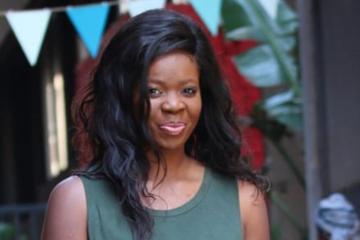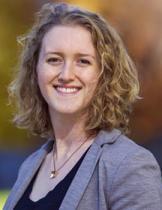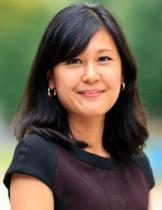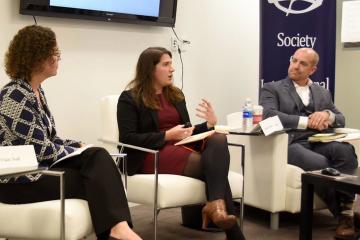
Olawunmi Ola-Busari, J-PAL ’18, balances the science of research with the art of policymaking

The Alumni Spotlight series highlights J-PAL alumni who are making an impact across industries and around the world. To nominate a J-PAL alum to be featured in a future Alumni Spotlight, please fill out this form.
In the next installment of our Alumni Spotlight series, we speak with Olawunmi Ola-Busari, a former policy associate at J-PAL Africa. Olawunmi joined J-PAL Africa right after graduating college and spent three years building the office’s presence in the region.
Now a graduate student in the Georgetown School of Foreign Service's Global Human Development program, she reflects on her path to international development, the experience of being a policy associate, and the transition back to graduate school.
Tell us a bit about your background. What led you to work at J-PAL?
Growing up in eSwatini, I was exposed to a lot of people from different walks of life. I think that instilled in me a natural curiosity about the world and how it works. As I got older and read a lot of postcolonial literature, I began to question how African countries and African people were seen on the world stage. When I would visit different communities, I became conscious of the fact that the economy doesn't work for everyone, even though this contrasted with my own experience. This made me question this disparity and inspired me to want to understand how to restore dignity back to people. From there, international development was a very obvious path to follow.
I went into college looking for a framework to understand poverty and inequality. I studied economics assuming the theoretical knowledge to do research was all I needed, but I came out disillusioned about the impact that research actually had on the low- and middle-income countries. While I still valued economic research, I needed to see how it could impact real lives.
While in college, I became increasingly interested in the power dynamics inherent in the development process. I wanted to learn how to get people with power to value research, and think about how research itself can better acknowledge that development has the potential to be disruptive. The policy aspect of J-PAL Africa’s work really spoke to those things and offered me the opportunity to get involved in the evidence to policy process.
What was your role at J-PAL Africa?
I was a Policy Associate at J-PAL Africa, and for me, it was about balancing the science of research and the art of policymaking.
As the bridge between evidence generation and evidence use, I had to balance the incentives and priorities of the researchers with those of the policymakers and practitioners. In practical terms, it meant synthesizing evidence in a way that was meaningful to the people meant to operationalize it, having a firm grasp of the value of the research, and understanding the priorities of our development partners.
It also meant being honest and upfront about the limitations of the research, what lessons we could draw from it, and what contribution we could make with it. At the end of the day, we have to be humble in our approach, and that's something I loved about working at J-PAL Africa.
What were some of the projects that you worked on at J-PAL Africa, and what did you find most rewarding and challenging?
Most of my work focused on three projects: piloting asset-collateralized loans for water tanks in Rwanda, scaling up electoral debates between MP candidates in Sierra Leone, and disseminating evidence on improving governance and electoral participation.
My day-to-day work involved writing reports, conducting surveys and semi-structured interviews in the field, data analysis, giving presentations, attending meetings, and taking photos. The most rewarding aspect of the work was my interactions with the participants in the various programs, and collaborating with local officials. In those conversations I really got the information I needed to be able to think about adapting an intervention to a new context.
I think it really taught me the importance of listening before acting. One of the most challenging aspects of the work was that it could all be very unpredictable. You need to learn to detect policy windows and act fast once you do. You have to be flexible; you have to be open to making quick, last-minute changes.
You’re in graduate school right now–could you tell us about your program and how the transition back to academic life has been?
I am doing a Master's in Global Human Development at Georgetown in the School of Foreign Service. I was drawn to this program because of its emphasis on the practical. The program challenges you to think about what role theory, econometrics, and data analysis play in the everyday work of a development professional. I love that most of the faculty are development practitioners themselves, and all the students in the program have work experience. For my summer internship, I’m providing support to a World Bank project in Ghana.
Making the transition from work back to school can be hard for a lot of people, in part because you don't have your weekends to yourself anymore. In addition, when you’re in school, sometimes it's easy to lose track of what drives you and it can be hard to stay motivated when you're stuck in a web of problem sets and the theoretical abstraction of academic life. That said, being in school gives you space to ask yourself the bigger questions and builds your capacity to ask the right questions.
So beyond asking the right questions, what do you hope to do after graduate school?
I want to help public sector actors deliver services more efficiently, as well as build the capacity of citizens to hold the state accountable. And where the latter is not possible, I want to expand the innovation that happens in response to state failure–one thing my experience in the field has taught me is that people will always find a way to carry on. I think we need to focus more on the indigenous ways that people are reacting to state failure and think about how to formalize or give more power to those methods.
I was at J-PAL during the launch of the Government Partnership Initiative [now the Innovation in Government Initiative], which helps governments to adapt, pilot, and scale evidence-informed innovations, and it inspired me to concentrate on the public sector. I’ve always wanted to do this work in sub-Saharan Africa, in the spirit of giving back to the people and the community who raised me.
Related Content

Meghan Mahoney, J-PAL ‘16, is building a career in impact evaluation. What has she learned along the way?
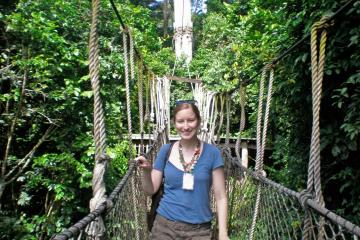
Caitlin Tulloch, J-PAL ‘13, on innovation in cost-effectiveness analyses and building effective policy partnerships
